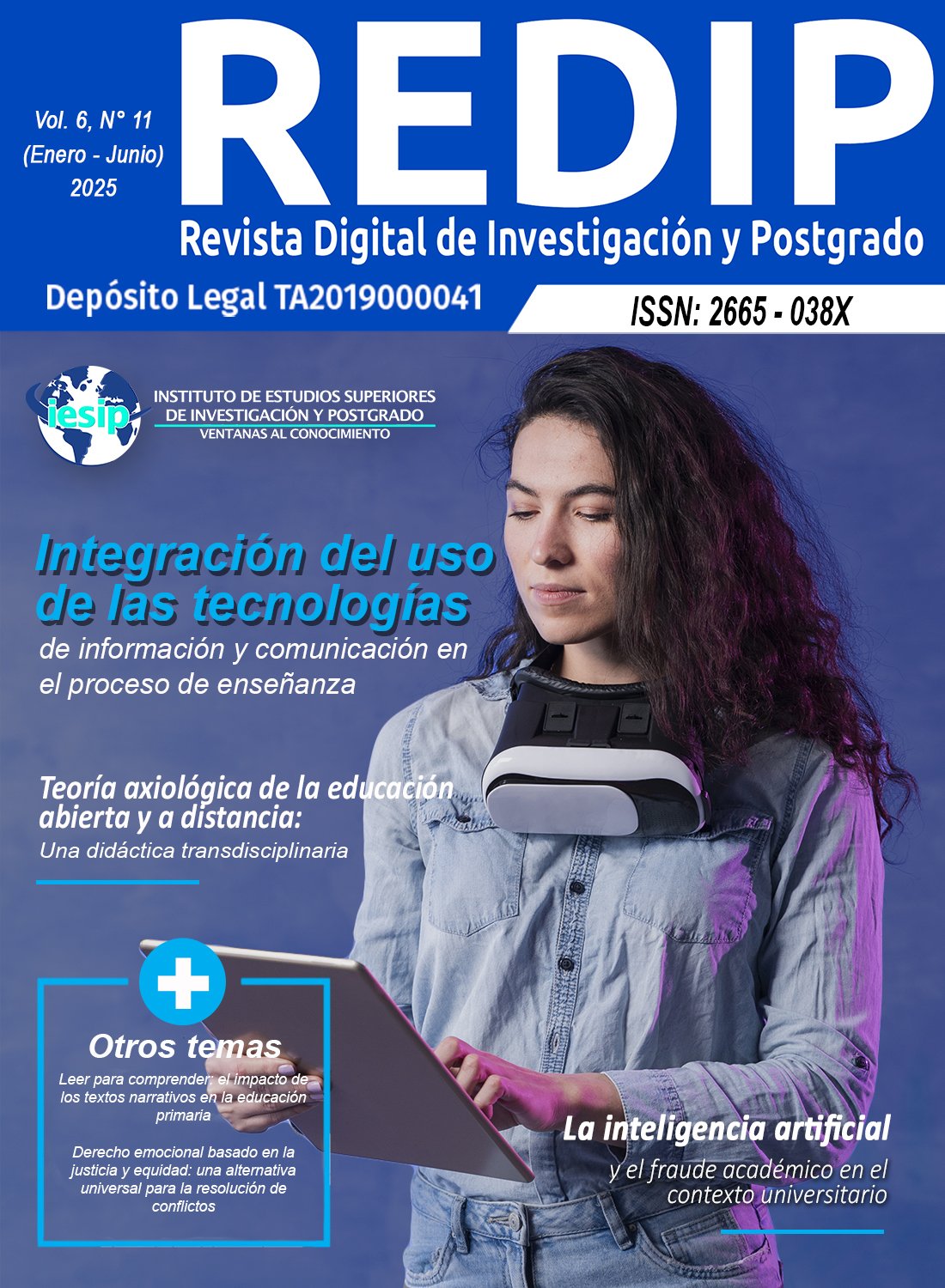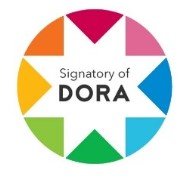Artificial intelligence and academic fraud in the university context
DOI:
https://doi.org/10.59654/kg944e15Keywords:
Artificial intelligence, academic fraud, correlation.Abstract
The study arises from the growing observation of the use of AI in education and the inability of students to explain their processes, suggesting the misuse of AI in their work. The objective was to determine the relationship between the use of AI and academic fraud in the university context. The methodology was positivist, with a quantitative approach and correlational level. A virtual questionnaire was used, with a reliability of 0.980 and validated by five experts, applied to a sample of 144 faculty advisors (48 from Venezuela, 48 from Colombia, and 44 from Peru). The results showed a Pearson correlation of 0.980 between the use of AI and academic fraud, indicating a very strong positive relationship
Downloads
References
Alonso, A. J. y Quinde, C. M. (2023). ChatGPT: La creación automática de textos académicos con Inteligencia artificial y su impacto en la comunicación académica y educativa. Desiderata, 6(22), 136-142. https://gredos.usal.es/handle/10366/152505
Alonso, R. A. (2024). Hacia un marco ético de la inteligencia artificial en la educación. Teoría de la Educación. Revista Interuniversitaria, 36(2), 79-98. https://revistas.usal.es/tres/index.php/1130-3743/article/view/31821
Belda, I. (2019). Inteligencia artificial. RBA Libros.
Caceres, K., y Ulloa, S. (2023). Implicancias del uso de la inteligencia artificial al emitir resoluciones judiciales respecto de los Derechos Fundamentales. [Tesis de grado, Universidad Cesar Vallejo] https://repositorio.ucv.edu.pe/handle/20.500.12692/144174
Crawford, K. (2023). Atlas de inteligencia artificial: Poder, política y costos planetarios. Fondo de Cultura Económica Argentina.
Díaz, D. (2023). Inteligencia artificial vs. Turnitin: implicaciones para el plagio académico. Revista cognosis 8 (1) 15-26 https://doi.org/10.33936/cognosis.v8i1.5517
Franganillo, J. (2022). Contenido generado por inteligencia artificial: oportunidades y amenazas. Anuario ThinkEPI, 16. https://doi.org/10.3145/thinkepi.2022.e16a24
Gallent, T. C., Zapata, G. A., y Ortego, H. J. (2023). El impacto de la inteligencia artificial generativa en educación superior: una mirada desde la ética y la integridad académica. RELIEVE. Revista Electrónica de Investigación y Evaluación Educativa, 29(2), 1-21. https://www.redalyc.org/journal/916/91676028011/91676028011.pdf
García, F.., Llorens, L. F. y Vidal, J. (2024). The new reality of education in the face of advances in generative artificial intelligence. [La nueva realidad de la educación ante los avances de la inteligencia artificial generativa]. RIED-Revista Iberoamericana de Educación a Distancia, 27(1). https://doi.org/10.5944/ried.27.1.37716
Granero, H. (2021). Inteligencia artificial y derecho, un reto social. elDial. com.
Hurtado, M. (2020). Liderazgo pedagógico e inteligencia artificial Maestría en educación de una institución de educación superior. Estudio de caso. .[Tesis de maestría, Universidad militar de Granada] https://repository.unimilitar.edu.co/handle/10654/36061
Jofre, C. (2023). ChatGPT, Inteligencia Artificial y Universidad. Nuevas tensiones, transformaciones y desafíos en la educación superior. Campo Universitario, 4(7). https://www.academia.edu/download/104836259/ChatGPT_Inteligencia_artificial_y_Universidad.pdf
Mayta, T. P., Borja, G. R., y Angulo, B. Y. (2023). Compra y venta de autorías en Perú: Fraude científico, mala conducta científica o práctica cuestionable en investigación. Revista del Cuerpo Médico Hospital Nacional Almanzor Aguinaga Asenjo, 16(4). http://www.cmhnaaa.org.pe/ojs/index.php/rcmhnaaa/article/download/2370/878
Puche, D. (2024). Fraude académico en los trabajos de investigación: Desafíos y ética en la integridad académica. Revista En Prospectiva| Universidad Yacambú, 5(1), 61-89. https://revista.uny.edu.ve/ojs/index.php/en-prospectiva/article/view/371
Soria, E., Rodríguez, P., García, Q., Vaquer, F., Vicent, J. y Vila, J. (2022). Inteligencia artificial. Ra-Ma Editorial.
VanderLinde, G., y Cury, T. M. (2024). El uso de inteligencia artificial y sus desafíos para la evaluación académica: una revisión de la literatura. Cuaderno de Pedagogía Universitaria, 21(41), 126-137. https://www.google.com/url?sa=t&rct=j&q=&esrc=s&source=web&cd=&cad=rja&uact=8&ved=2ahUKEwiwiOf3tsaKAxXk1QIHHeT2JoAQFnoECBoQAQ&url=https%3A%2F%2Fcuaderno.pucmm.edu.do%2Findex.php%2Fcuadernodepedagogia%2Farticle%2Fview%2F564&usg=AOvVaw2t2lGDQWWTLbK6I5TgaDny&opi=89978449
Villalobos, L. J. (2024). El Plagio Académico y las Repercusiones Legales en las Tesis de Grado en México. Revista Docentes 2.0, 17(1), 5-17. https://ojs.docentes20.com/index.php/revista-docentes20/article/view/436
Vries, W. (2023). Como (no) combatir el fraude académico: Lecciones internacionales. Revista mexicana de investigación educativa, 28(97), 637-650. https://www.scielo.org.mx/scielo.php?pid=S1405-66662023000200637&script=sci_arttext
Zuñiga, G. y Polanco, P. (2023). Plagio y ética profesional en el proceso de investigación social. Revista de la Universidad, 1, 50-59. https://doi.org/10.5377/ru.v1i1.17244
Downloads
Published
Issue
Section
License
Copyright (c) 2025 Revista Digital de Investigación y Postgrado

This work is licensed under a Creative Commons Attribution-NonCommercial-ShareAlike 4.0 International License.
Esta licencia permite a los reutilizadores distribuir, remezclar, adaptar y desarrollar el material en cualquier medio o formato únicamente con fines no comerciales, y solo siempre que se atribuya al creador. Si remezclas, adaptas o construyes sobre el material, debes licenciar el material modificado bajo términos idénticos. CC BY-NC-SA incluye los siguientes elementos:
![]() POR: se debe dar crédito al creador.
POR: se debe dar crédito al creador.![]() NC: Sólo se permiten usos no comerciales de la obra.
NC: Sólo se permiten usos no comerciales de la obra.![]() SA: Las adaptaciones deben compartirse en los mismos términos.
SA: Las adaptaciones deben compartirse en los mismos términos.











